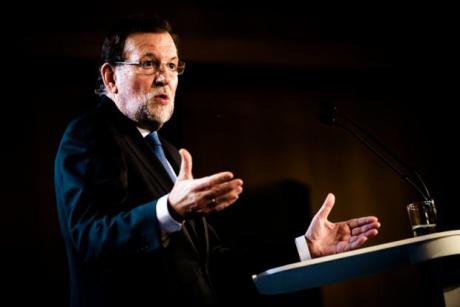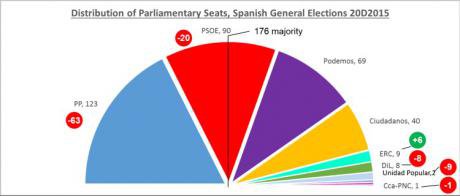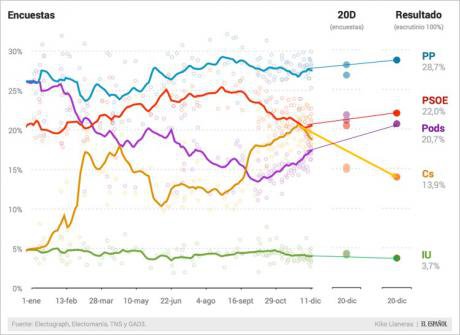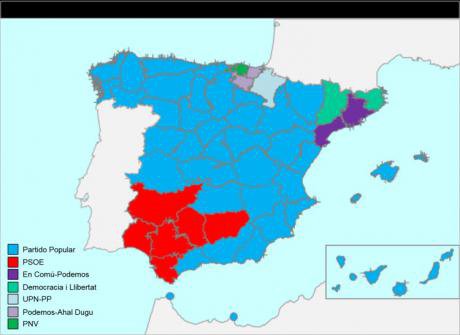
Mariano Rajoy, Spanish Head of Government. Matthias Oesterle/Demotix. All rights reserved
Spain celebrated general elections on Sunday the 20th of December and the result was an even worse than predicted fragmentation of the political landscape[1]. Although the governing Partido Popular of Mariano Rajoy won the greatest number of seats, the scandal-ridden party fell well short of the majority of 173 seats needed to form a government. To make matters worse, the centrist Ciudadanos party of Albert Rivera did considerably worse than expected after climbing steadily in the polls in the run-up to the election. This means that a Populares+Ciudadanos coalition would still far short of the majority needed to govern and gives the Spanish Left a powerful blocking position, which they have promised to exercise.

Prime Minister Rajoy declared victory last night, but admitted that his party faced a long and difficult negotiation in order to win the necessary support to form a government. The Spanish King will likely allow Mr. Rajoy to form a government, but it must survive a vote of confidence as soon as the new assembly sits. Messrs. Sánchez and Iglesias have issued statements declaring their opposition to a new PP government[2]. If he fails to win a simple majority in the first vote, a second vote is held within 48 hours in which the new government needs only win plurality of votes, discounting abstentions. Yet even this hurdle seems to be above the means of the Populares: their only possible supporters are Ciudadanos and possibly PNV and PNC. That would net Mr. Rajoy 170 votes in favor and the opposition (assuming no abstentions) 180 votes against.
That would open the door to a “Broad Front” coalition of leftist groups, led by the Socialists. Yet here again, the waters are murky. It is easy to see a grouping of PSOE, Podemos and Unidad Popular (161 seats), but harder to see anyone else joining. Mr. Sánchez has stated that the unity of Spain is non-negotiable, which would seem to rule out the two Catalan parties with their 17 seats. Mr. Rivera of Ciudadanos has ruled out making any pact with Podemos, which would seem to exclude their 40 delegates as well; unless, by a process of political alchemy, it became acceptable to make a deal with the Socialists that just happened to include Podemos. Indeed, a PSOE+Podemos+Ciudadanos “grand coalition” could be very appealing: it would by necessity have to hew close to a moderate center-left policy as anything “radical” would be vetoed by the Ciudadanos delegates, while too much austerity would be vetoed by the Podemos delegates. Whether Mr. Rivera would be willing to prove so flexible in his interpretation of his recent vow remains to be seen, but it would give the country a measure of stability and would avoid repeat elections if no grouping proved capable of governing 2 months after the initial ballot.
- The result is a clear protest vote against the Partido Popular and its autocratic and divisive administration. Somehow more than a quarter of Spaniards prefer the rule of a corrupt mediocrity to the possibility of change, yet many more have opted for a change at the top;
- They also show the still powerful forces of regionalism in Spain, as the purple-colored bloc relied heavily on alliances with local parties in several communities, e.g. En Comú-Podem in Catalonia, En Marea in Galicia, Compromís in Valencia. These parties find a convenient umbrella organization in Podemos that allows them to play on the national stage in a way they never could by themselves, yet which remains dedicated to a very loose federalism as their ideal model for the nation. Podemos also seemed to benefit from a “hidden voter effect”, those who, not wishing to appear “radical” in polls, nevertheless supported the leftist party at the ballot box;
- Ciudadanos strangely underperformed after climbing steadily in the polls. A week before the election, Mr. Rivera’s party was polling better than 20% of voter intention yet collapsed to only 14% on Election Day.

- The long decline of Convergencia in Catalonia has only been confirmed in this election, with the new national grouping, Democracia I Llibertat, losing 8 seats while its rival Esquerra Republicana gained 6 seats and eclipsed its center-right rival for the first time in history;
- There is something still very wrong with the Spanish model, in which the National Basque Party (PNV) gains three times more seats than the United Left (Unidad Popular) even though the latter had three times as many votes (923,105 vs. 301,585);
- The “Two Party System” in Spain has taken a beating, but is not yet completely dead. A look at a map of electoral results by province reveals a picture that is not very different from past elections. The system, supported by the Spanish Constitution and a substantial degree of institutional inertia, has proven resilient. It remains to be seen whether time will continue to sanctify the new political parties, or whether the corrosive effects of power and governance will slowly transform them into slightly more successful versions of UPyD and Izquierda Unida.

The election also guarantees that the independence movement in Catalonia will continue. A fragmented national government, without an absolute majority to act decisively, is precisely the condition sought by the “transitional team” in the Parlament. The weakness of Artur Mas and his party in the national elections may have convinced CUP to proceed with the plan of granting his party enough delegates to keep the presidency while abstaining with the rest. The rationale would be that he and his party are “dead men walking” and no longer serious rivals once independence has been achieved.
Regardless of CUP’s thought process, Catalan independence is far from a dead issue. There will continue to be significant tension between Madrid and her prickliest region throughout 2016 with a real possibility of a break-away declaration of independence coming at some point during the year – possibly in September. And as Spain’s dysfunctional political system begins to resemble Portugal’s more and more, it is difficult to imagine any of the much needed political, economic or social reforms being enacted, even with pressure from Brussels. Markets seem to agree[3], which is why the stock exchange opened 350 points lower after the election and the 10-year Spanish bond rose 50 basis points.

The forces that have led Spain to this pass are not going away anytime soon[4]. They are the results of forces acting out across the European Union and at the global level, over which the country has little or no control. Spain is in for weeks of political paralysis; but the dysfunction and fragmentation will continue for years to come.
Sources and Notes
Warning: In compliance with Spanish Intellectual Property law, Common Sense no longer quotes nor reproduces links to sites based in Spain. Verification of the veracity of this information is the sole responsibility of the reader.
[1] “Rajoy will first try to form govt but deadlock could see new elections,” The Local Spain, 21 December 2015
[2] AFP, “Spain’s main left-wing parties to block conservative Rajoy-led government,” Daily Sabah, 21 December 2015
[3] Trading Economics (www.tradingeconomics.com)
[4] Fernando Betancor, “Spanish Malaise Characteristic of Europe,” Common Sense, 01 October 2015
Read more
Get our weekly email
Comments
We encourage anyone to comment, please consult the oD commenting guidelines if you have any questions.